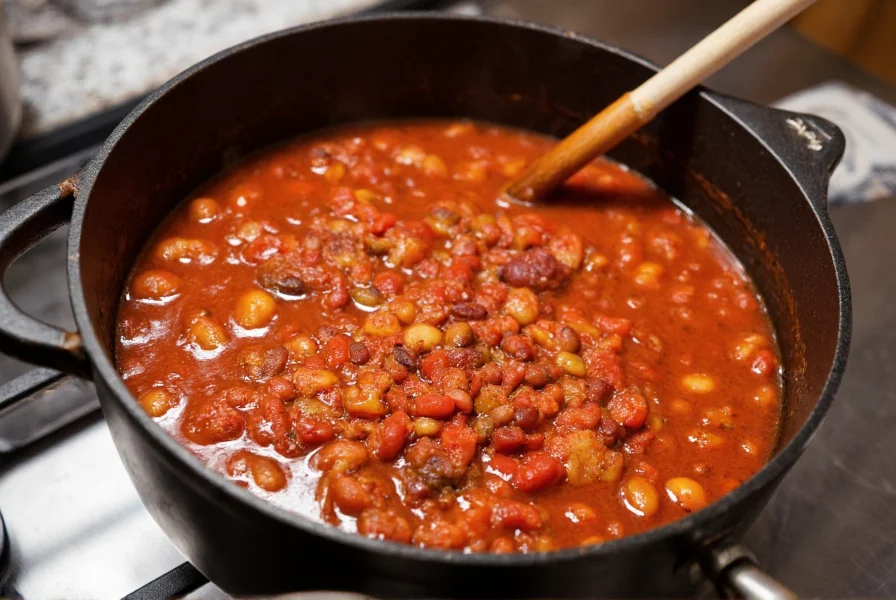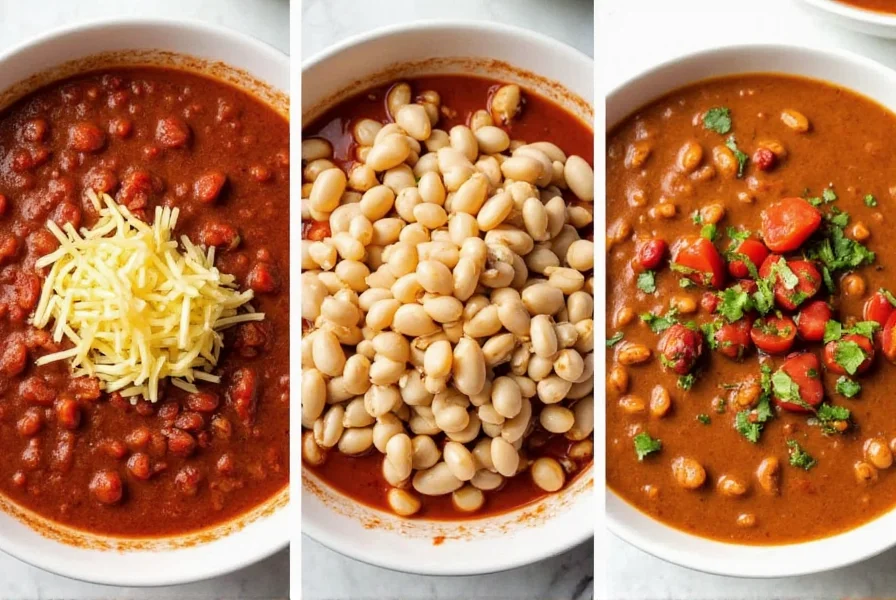Beans transform chili from a simple meat stew into a hearty, nutritious meal packed with fiber and protein. While traditional Texas-style chili often omits beans, most regional variations across the United States and Mexico incorporate them for added texture and nutrition. Understanding which beans work best and when to add them makes all the difference in creating exceptional chili.
Why Beans Belong in Your Chili
Despite the longstanding "beans debate" in chili circles, historical evidence shows beans have been part of chili recipes since the late 19th century. Mexican chili con carne often included beans as a practical protein source. Modern nutrition science confirms that beans boost chili's fiber content by 40% and increase satiety, making bean chili recipes ideal for family meals and meal prep.
Best Beans for Chili Recipes
Not all beans perform equally in chili. Each variety brings distinct texture and flavor characteristics:
| Bean Type | Best For | Texture When Cooked | Flavor Profile |
|---|---|---|---|
| Kidney Beans | Classic Texas-style chili | Firm, holds shape | Earthy, robust |
| Pinto Beans | Southwestern and New Mexico chili | Creamy, slightly grainy | Nutty, mild |
| Black Beans | Cuban and Caribbean-inspired chili | Firm, smooth | Sweet, earthy |
| Great Northern Beans | White chili variations | Delicate, tender | Subtle, buttery |
For authentic bean chili recipes, use dried beans instead of canned whenever possible. Soak dried beans overnight, then par-cook them separately before adding to your chili during the final 30 minutes of simmering. This prevents beans from becoming mushy while allowing them to absorb flavors.

Classic Bean Chili Recipe for Beginners
This easy bean chili recipe for beginners balances traditional flavors with approachable techniques. Makes 6 servings.
Ingredients
- 1.5 lbs ground chuck or plant-based alternative
- 2 (15oz) cans kidney beans, drained (or 3 cups soaked dried beans)
- 1 large yellow onion, diced
- 4 cloves garlic, minced
- 28oz crushed tomatoes
- 2 tbsp chili powder
- 1.5 tbsp cumin
- 1 tsp smoked paprika
- 1 tsp oregano
- 2 cups beef or vegetable broth
- Salt and pepper to taste
Instructions
- Brown meat in large pot over medium-high heat. Drain excess fat.
- Add onions and garlic, sauté until translucent (5 minutes).
- Stir in spices and cook 1 minute until fragrant.
- Add tomatoes, broth, and par-cooked beans.
- Simmer uncovered for 60-90 minutes, stirring occasionally.
- Season with salt and pepper. Rest 15 minutes before serving.
Regional Variations of Bean Chili
Authentic chili recipes with beans vary significantly by region:
Texas Red with Beans
While purists claim true Texas chili contains no beans, many Central Texas home cooks add pinto beans for heartiness. This variation uses dried ancho and guajillo chilies blended into the broth, with minimal spices beyond cumin and garlic.
Cincinnati-Style Chili
This unexpected regional specialty features kidney beans in a Mediterranean-spiced chili served over spaghetti. Distinctive for its inclusion of cinnamon, allspice, and cocoa powder, Cincinnati chili represents one of America's most creative bean chili recipes.
Vegetarian Three-Bean Chili
For healthy bean chili recipes, combine black beans, kidney beans, and pinto beans with fire-roasted tomatoes, corn, and chipotle peppers. Replace meat with textured vegetable protein or extra beans for complete protein.

Slow Cooker Bean Chili Secrets
Slow cooker chili recipes with beans require specific techniques to prevent mushiness:
- Add beans during the last 2 hours of cooking
- Use the "high" setting for first hour, then switch to "low"
- Stir in 1 tbsp masa harina during the last 30 minutes for authentic thickening
- Finish with fresh lime juice and cilantro
Nutritional Benefits of Bean Chili
Bean chili recipes deliver impressive nutritional advantages over beanless versions:
- 40% more dietary fiber (15g per serving)
- Complete protein profile when combined with meat or grains
- Lower glycemic index for sustained energy
- Rich in folate, iron, and potassium
Studies show regular consumption of bean-based dishes correlates with improved heart health and better blood sugar regulation. The soluble fiber in beans binds to cholesterol in the digestive tract, helping remove it from the body.
Avoiding Common Bean Chili Mistakes
Even experienced cooks make these errors with bean chili recipes:
- Adding beans too early - Causes disintegration and mushiness
- Over-seasoning before simmering - Flavors concentrate as liquid reduces
- Using canned beans without rinsing - Starchy liquid affects texture
- Skipping the resting period - Chili needs 15-30 minutes off-heat for flavors to meld
Storage and Reheating Tips
Bean chili recipes actually improve after refrigeration. Store in airtight containers for up to 5 days or freeze for 3 months. When reheating:
- Add 2-3 tbsp broth or water to restore moisture
- Reheat gently over medium-low heat
- Stir frequently to prevent sticking
- Finish with fresh acid (lime juice or vinegar) to brighten flavors
Perfect Pairings for Bean Chili
Elevate your bean chili recipes with these complementary sides:
- Cornbread with honey butter
- Avocado slices with lime
- Sharp cheddar cheese
- Quick-pickled red onions
- Fresh cilantro and sour cream
FAQ
Can I make chili with beans in an Instant Pot?
Yes, you can make excellent chili with beans in an Instant Pot. Use the sauté function to brown meat and vegetables, then add all ingredients except beans. Pressure cook for 15 minutes, quick release, then add pre-cooked beans and use the sauté function again for 10 minutes to thicken. This creates perfect texture without mushy beans.
Why do some chili recipes call for coffee?
Coffee enhances chili recipes with beans by adding subtle bitterness that balances sweetness from tomatoes, deepening the overall flavor profile. The acids in coffee also help tenderize meat. Use 1/2 cup strong brewed coffee instead of an equal amount of broth for richer flavor without noticeable coffee taste.
How can I thicken bean chili without affecting flavor?
The best way to thicken bean chili without altering flavor is to create a slurry with masa harina (corn dough). Mix 2 tablespoons masa with 1/4 cup cold water, then stir into simmering chili. Cook for 5 minutes until thickened. This traditional technique adds authentic depth while improving texture.
Are canned beans acceptable for authentic chili recipes?
Canned beans work well for weeknight chili recipes with beans when time is limited. Always rinse canned beans thoroughly to remove excess sodium and the starchy liquid that can make chili gluey. For best results, add canned beans during the last 20 minutes of cooking to maintain texture.










 浙公网安备
33010002000092号
浙公网安备
33010002000092号 浙B2-20120091-4
浙B2-20120091-4